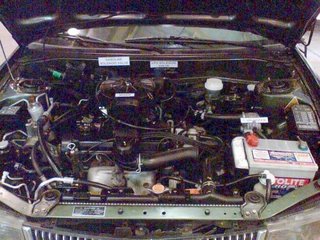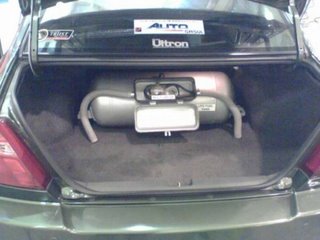|

Monday, September 18, 2006
LPG Powered Cars and Taxi Cabs
 With fuel prices at an all-time high, more people are looking for ways to cut transportation cost with the least effect on mobility and convenience. Auto manufacturers are continuously developing engines powered by electricity and natural gas. However, it may take more than 10 years before these technologies can be perfected and priced reasonably for consumers to start buying them. With fuel prices at an all-time high, more people are looking for ways to cut transportation cost with the least effect on mobility and convenience. Auto manufacturers are continuously developing engines powered by electricity and natural gas. However, it may take more than 10 years before these technologies can be perfected and priced reasonably for consumers to start buying them.
In an effort to help car owners solve the problem of high fuel costs, Petron Corporation recently introduced, or re-introduced rather, the use of Liquefied Petroleum Gas (LPG) on gasoline-powered vehicles. This technology, which is popular in several industrialized countries like Italy, Japan, South Korea and the US, has been in use for more than four decades. Worldwide, there are close to 10 million motorists already using LPG to power their vehicles.
In the Philippines, the use of LPG became popular when hundreds of Korean-made taxis swamped the metropolis during the early 90’s. However, the technology did not flourish mainly because the infrastructure for refueling and servicing of LPG powered vehicles were limited and none of the big three oil companies gave it support. Fuel prices back then was so cheap that oil companies saw LPG as a competition — and not giving it support only meant that it will die a natural death — and it did.
Now, however, Petron has taken the lead in developing and re-introducing this fuel-saving technology that will not only benefit the car owners, but the environment as well. With the launch of Petron Xtend autogas, vehicle owners now have a sensible choice of using an alternative fuel that is cheaper and a lot cleaner.
Although LPG-powered engines consume five to seven percent more fuel per liter compared to gasoline, the difference is compensated by the big price difference between the two fuels. The current price of LPG (P25/liter) is at least 30 percent cheaper than the cheapest gasoline (P36.71/liter).
In a recent study made by Petron, they found that motorists, with a car powered by a 1600cc engine, who travel an average of 50 kilometers a day can save P50 daily, or P1 per kilometer traveled. In effect, the savings would relate to P350 per week or P18,200 a year.
Petron engineers explained that motorists who use LPG will also earn savings from reduced maintenance cost of their vehicles. According to Wilfredo Toledo, Petron’s Technical Department manager, using LPG will result in longer maintenance intervals such as oil changes and tune-ups as LPG has less contaminants, has only minute traces of sulfur, has low carbon content and no lead, leaving engine parts much cleaner and with less wear.
According to Toledo, Petron Xtend autogas has been proven to be environment-friendlier compared to gasoline. For comparison, Toledo revealed that for every kilometer traveled, a gasoline-fed car emits 0.001 gram of particulates, 0.14 gram of hydrocarbons and nitrogen oxide, 190 grams of carbon dioxide and 0.6 gram of carbon monoxide.
Xtend autogas, on the other hand, results in less than 0.001 gram of particulates, 0.09 gram of hydrocarbons and nitrogen oxide, 170 grams of carbon dioxide and 0.3 gram of carbon monoxide.
Toledo explained that LPG is a mixture of hydrocarbons composed mainly of 60 to 70 percent propane and 30 to 40 percent butane. When it is pressurized it becomes a liquid and it is in this form that it is pumped into the vehicle’s fuel tank.
Compared to gasoline, Xtend autogas has a higher content resulting in cleaner burning characteristics. For comparison, super grade gasoline only has a 98 octane rating, unleaded has 93 to 95 while LPG has an octane rating of 104. Once released into the engine, it will naturally become pure gas, resulting in a more efficient combustion.
Having driven a brand new car powered by LPG for a test drive, we felt only a slight change in engine performance (about five to 10 percent less). However, Toledo was quick to say that the engine can easily be tuned to increase the power. But even with the slight loss of power, the car still drove well, no smoke came out from the tail pipe, the carbon exhaust smell was nowhere and the engine noticeably run much quieter.
But with all these favorable points, there lies one drawback. The price of having an LPG system installed is a bit high, P26,000 to be exact. However, Petron engineers were quick to say that the initial investment, which is the same as the cost of a brand new cell phone, can be recouped in a matter or months.
Commenting on its safety, Toledo said "10 million people cannot be wrong. LPG has a safety record as good if not better than gasoline."
Toledo added that the LPG tanks and conversion kits they install are made of the highest quality steel and have been tested to withstand high-pressure. They are very durable and do not easily puncture like gasoline and other fuel tanks. For added safety, Toledo advised that motorists have the conversion kits installed at authorized Petron Xtend autogas stations.
At present, the Xtend autogas refilling stations can be found at Valle Verde 1 along C-5 Road in Pasig and on Gil Puyat Avenue corner Makati Avenue in Makati. More Xtend autogas dispensing stations will be put up within the year all across Metro Manila and in key cities and provinces all over the Philippines.
Petron Xtend autogas: LPG for gas-powered engine re-introduced
By ANJO PEREZ
----------
Cook with it, drive with it � and enjoy a cleaner ride.
The same liquefied petroleum gas (LPG) used for cooking food is now being used to fuel taxicabs that ply the busy streets of Metro Manila.
Xavierville Transport Service (XTS) has a fleet of 50 cabs operating all over Metro Manila and it is one of the few taxi companies now using LPG as an alternative fuel source.
At a time when diesel and gasoline prices are going through the roof, it is also worth noting that these vehicles for hire use fuel that costs less.
The STAR learned of this after chancing upon a Xavierville cab in Makati City.
The driver said in an apologetic tone that they do not allow passengers to smoke while in the cab because they have an LPG tank on board which is powering the cab�s engine.
Posted conspicuously inside the cab was a sign that read: "LPG-powered vehicle. Please do not smoke."
XTS operations manager Allan Redondo said in an interview that his company was among the first to use LPG as fuel for their fleet for a number of reasons.
Redondo said he has heard that taxi units belonging to cab companies EMP, Freedom and Monique have also scrapped the use of conventional diesel or gasoline in favor of the cheaper and cleaner LPG.
"Our cabs are equipped with conversion gears which vaporize liquid fuel from LPG containers for fuel," he said.
XTS, he said, started installing the conversion kits manufactured and distributed by the Torkita company in August last year and completed the installation of the gadget in all their vehicles in December 2005.
Manila�s cab companies are following a trend in using LPG fuel that began in Japan and in Bangkok, Thailand, where roughly 60 percent of taxicabs were fueled by LPG as of mid-2005.
LPG, Redondo said, is bought from Petron, which is working in partnership with Torkita.
XTS, based in Para�aque City, invested more than P1.3 million in the LPG conversion of its units and expects to recover the amount in two years.
Redondo said the company had to spend P26,000 for the conversion of each taxi unit and had to take out a bank loan to finance the project.
"It�s a long-term investment but it�s worth it," he said citing three main reasons and several advantages brought about by the use of LPG.
"Basically, there are three reasons why we invested in this. First, it�s for our drivers," Redondo said explaining how the use of LPG allows their employees to earn more.
XTS drivers, he said, earn by first meeting the boundary requirement while shouldering high fuel costs because the cost of fuel is not charged to the company�s share of the day�s proceeds.
Redondo said LPG costs only P26 per liter which means that drivers save more than P10 per liter, based on the current prices of unleaded and premium gasoline.
"Obviously, they earn more and are motivated to work more," he said, stressing that their company tries to consider how they can make their drivers happier.
Secondly, he said, using LPG as fuel, "in our own little way, is our contribution to the implementation of the Clean Air Act."
Redondo said the smoke emission rate of their taxis is now at negative levels, which means that their engines are burning "cleaner" fuel, thus reducing harmful smoke emissions.
He also said that using LPG as fuel is XTS� contribution to the national government�s call for the use of alternative and cheaper fuel sources.
Other alternative fuels promoted by the government are coco-biodiesel, derived from coconuts, and ethanol, which is derived from either sugarcane or corn. Both alternative fuels also burn clean, with minimal smoke emissions.
Redondo said shifting to LPG from ordinary diesel and gasoline also prolongs engine life and extends the time between tune-ups and oil changes � which makes for even more savings in terms of vehicle maintenance.
Besides being cost-efficient, the LPG conversion system installed in every Xavierville taxi unit is also very safe.
Laughing, Redondo said the warning against smoking because the vehicle runs on LPG is actually a bluff, taking advantage of the public�s fear of exploding gas tanks.
"It�s just a precaution, but it�s actually a misconception that an LPG will explode because of cigarette smoking," he said.
He confessed that the public�s fear of LPGs was being used to give their taxi drivers a valid reason to ask their passengers to refrain from smoking.
"There are a lot of safety precautions. There are check valves and the like that actually shut down the entire system in the event of any leak no matter how small," Redondo said.
However, public ordinances have been passed in some cities and towns in Metro Manila banning passengers and drivers of public conveyances like taxis from smoking while in these vehicles.
Metro taxis now running on LPG
By Michael Punongbayan
The Philippine Star 02/04/2006
----------
LPG Converted Mitsu Lancer


----------
Want to convert your car? Here are the contact details of NAIADDS:
NAIADSS
2604 Orient Square Bldg, Don Francisco Ortigas Jr. Rd
Ortigas Center, Pasig City.
tel: 687-7970 687-1659 6879151
fax: 687-9207
email: naiadss@pldtdsl.net
(They can install the LPG system at your home or office.)
Inquiry on refilling Stations?
Petron
tel: 671-9817
fax: 671-2689
email: gasul@petron.com
website: www.petron.com
SOURCES: Manila Bulletin, Philippine Star, Yehey! Tsikot Forums; Photos from ghosthunter of tsikot Forum.
Tags:
Entrepreneur Essentials, Small & Medium Business





Posted on 2:17 PM | 1 Comments | Email Story To Friends | Subscribe Via Email
1 Comments:
Now I've seen in UAE, Most of the vehicles running with gases instead of Oils. Really nice prediction.
Brothers Gas said this on Sunday, April 14, 2019 6:02:00 PM
..................................................
 BACK TO HOMEPAGE BACK TO HOMEPAGE



|





























